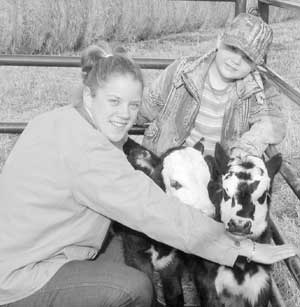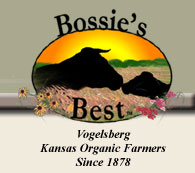| |
Busches
launch Bossie’s Best
|
Four
sets of twins in a 25-cow herd will be a plus for the Busches’
new business — organically grown beef
|
|
 Ali and
Isaac Busch corner twin calves Luke and Lizzie at their farm
north of Home
City. The family
has a herd of 25 cows and
had four sets of twins this spring. Luke and Lizzie are
offspring of Liz Ali's cow. Ali is a student at Kansas
State University, and Ike goes to St. Gregory's School. (Photo
by JoAnn Shum)
Ali and
Isaac Busch corner twin calves Luke and Lizzie at their farm
north of Home
City. The family
has a herd of 25 cows and
had four sets of twins this spring. Luke and Lizzie are
offspring of Liz Ali's cow. Ali is a student at Kansas
State University, and Ike goes to St. Gregory's School. (Photo
by JoAnn Shum)
|
By
Sally Gray
The
Marysville Advocate - March 16, 2000
On Feb. 1 a cow at the Nancy Vogelsberg-Busch family farm north
of Home City had twins.
“
In 21 years of farming and raising cattle I never had a set
of twins,” Nancy said.
Vogelsberg-Busch
called her son Noah and daughter, Ali, who are away at college,
and they came home on the weekend to celebrate with their mother
and younger brother, Isaac.A day after Noah and Ali
left, a second set of twins was born.
A week later, a third set was born.
Then a fourth set arrived.
That might not be unusual in a herd
of 500, but the Busches have 25 cows.
Nancy checked with an expert at the U.S. Department of Agriculture
research center in Clay Center, Neb., who said the twin rate
in dairy cattle is 3 percent and the rate in beef cattle is 1
percent. The Busches’ rate is 16 percent.
She called the research center when friends and fellow farmers
started crediting the bull. The center expert, who has done a
lot of research on twins, said it’s not the bull that gets
the credit but the mothers of the babies and their mothers and
fathers.
He also said there was an environmental component, which science
doesn’t fully understand, Nancy said.
“
To me, it’s an act of nature, a gift from God,” she
said.
She also has another theory. When the second set of twins was
born she thought about the single blue heron she used to see
circling her farm. The bird had flown alone over the farm for
10 years.
“
The kids and I saw it as a good omen, because there are enough
bad things that happen on the farm you have to think of good
omens,” Nancy said.
Late last summer she saw two blue herons circling above the farm
and realized the lone blue heron had a mate.
“
I took that as a really good sign,” she said.
Then this spring the twins arrived.
All are fraternal twins. Three sets were heifers, and one was
a heifer and bull. One heifer died.
Ali’s cow, Liz, had the heifer-bull set, and Ali named
the heifer Lizzie and the bull Luke. There is a 95 percent chance
that Lizzie is sterile, but the family has decided to keep the
brockle-face heifer anyway as a mascot.
“
She is such a sweetheart,” Ali said.
Nancy said she recently heard that the oldest Hereford cow died
at age 38 giving birth to her 35th calf.
“
We think that with no burden of calving, Lizzie could live to
be 40,” Nancy said.
The ancestry of the Busches’ herd goes back to Bossie,
Nancy’s parents’ milk cow who was a Guernsey-Angus
cross. Nancy bred Bossie to Holstein bulls and kept the heifers,
which she then bred to a polled Hereford bull that came from
Jim and Sue Rowland, Marysville. The bull was an orphan that
Nancy got as a newborn.
One of the offspring was Liz, which became Ali’s first
calf.
Liz was born premature, but Ali was thrilled anyway.
“
It was such a big deal — it was mine,” she said.
Nancy is particular about documenting the ancestry of her cattle
and uses names and not just numbers. For example, Bossie had
Belle, who had Beth, who had Liz.
Liz is also the mother of Anna, who had one of the sets of twins
this year.
Ali, a freshman at Kansas State University, helps keep track
of the herd history and health records.
Bossie is one of the three things Nancy received from her parents,
she said. Her father, John Vogelsberg, died in 1992 and her mother,
Loretta, is in CMH Long Term Care in Marysville.
The other two things, Nancy said, were the first right of refusal
to buy land and the skills to farm.
The Busches keep their heifers as replacement heifers because
of their good dispositions, Nancy said, and then they’re
bred to a purebred bull.
She expects the sets of twins to be good for her new business,
Bossie’s Best, which is organically grown beef. The beef
is certified organic by the Organic Crop Improvement Association,
which is recognized by the federal government as a certifying
agent and is currently the only one for beef.
Nancy has been working with Ron Hards at Welch Brothers Meat
Co. in Frankfort and government officials so that Welch can become
Nancy’s contract processor.
Nancy started marketing Bossie’s Best last year to a close
circle of friends, and her business has grown by word of mouth.
“
I put a lot of my energy in the product and not the packaging,” she
said.
Her customers now include a professor at K-State whose family
from Argentina is coming to visit this spring, and he plans to
have a barbecue for them and later visit the Busch farm.
Nancy’s customers range from a woman who is chemical-sensitive
and can have no antibiotics in the meat to a fellow farmer who,
Nancy said, couldn’t care less about organic beef but likes
the flavor and tenderness of Bossie’s Best.
A grocery store in Manhattan is interested in carrying her beef,
she said.
Direct marketing lets her price her own product.
“
I treat my cows like I do my kids,” Nancy said. “I
use preventive health care, such as vaccines.”
She does not use growth hormones or antibiotics in the cattle
and from the third stage of gestation to slaughter, the animals
can have no feed that is not OCIA-certified. Nancy’s whole
farm is OCIA-certified.
If she has to treat a cow for a specific ailment with antibiotics,
that animal is not sold as organic and is later sold at the sale
barn.
“
There is an extensive audit trail of each animal from birth to
slaughter,” she said.
Noah is a junior in biology at Emporia State University and will
student teach next fall with David Sampson at MHS.
Ali is majoring in kinesiology at K-State and plans a minor in
animal science. She used her computer skills to design Bossie’s
Best business cards and is working on a brochure and a Web site.
Isaac is a first-grader at St. Gregory’s and has taken
over the sweet corn business from Noah and Ali.
Nancy also works at Tension Envelope.
She is co-chairman of the livestock committee for the Kansas
Organic Producers and said what she is doing can be duplicated
on any farm that is OCIA certified.
She’s been invited to participate as a “resource
practitioner” at one of the sessions at a conference at
Yale University May 11 to 14. The theme is “The Good in
Nature and Humanity: Connecting Science, Religion and the Natural
World.” Scientists, religious and spiritual leaders, conservationists
and resource users will attend.
The conference is a collaborative effort of the Yale School of
Forestry and Environmental Studies, the Yale Divinity School,
the Wilderness Society and the National Religious Partnership
for the Environment and the Forum on Religion and Ecology.
The keynote speaker will be Wendell Berry, who will speak on “Faith
and Reason in an Age of Spiritual Doubt and Environment Destruction.”
Ali said she’s proud of her mother and what she’s
accomplished.
“
I have been involved with cattle my whole life and have contributed
to the work being done on our family farm, along with my brothers,
but none of it could have been possible without my mother,” Ali
said. “She is a very amazing and courageous woman. Her
strength and energy is unbelievable and is an incentive to me
to carry on our family tradition.
“ She has instilled in me the belief that you must approach things
in life with everything you have, giving it your all.”
Ali said she wanted to someday give her children the opportunities
she was given.
“
My mother always wants what is best for me and my brothers, but
at the same time she wants us to work hard and find out what
is best for ourselves,” she said.
|
|
|
|
|
|
|
|
|
|
100% Organic Beef
|


